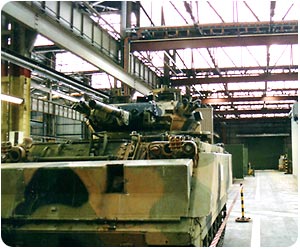The CalAir argon shielding gas reticulation system will be used in one of the country's largest welding projects, scheduled to extend through until 2010 as Tenix Defence extends the APCs and introduces improvements including better armour and mine protection plus new engines, turrets and weapons.
The easily reconfigured and recyclable CalAir polymer piping system has been installed into a ring system with pipeline drop feeds to double outlets to cope with the expanding workload as preliminary preparations for the work are undertaken this year and full production is scheduled to commence later in the year.
In addition to being about eight times lighter than conventional galvanized iron gas piping system, the non-corrosive, clean and light Pro-Pipe II system can be easily re-erected and altered as production needs change, says CalAir Pipe Systems (N. Vic) Manager Mr Peter Martin.
"The beauty of Pro-Pipe II systems for gases - as for liquids and compressed air - is that they can be so easily installed and so easily modified. If you wish, the entire system can be picked up and moved to a new location. Try that with gal and you will end up with a heap of scrap," said Mr Martin, who installed the 185 metre ring main at Bandiana.

Feeding gas at 600-700kpa, the 32mm internal diameter ring main conveys argon to a total of 11 droplines of 20mm internal diameter pipe feeding double outlets at workstations of the Army's Joint Logistics Unit facility of the Wadsworth Barracks.
The Bandiana ring system is designed to avoid energy sapping dead ends in the pipeline system, enabling gas to circulate smoothly at optimum pressure to where it is required to perform process tasks.
High pressure and heat tolerances. Being more than a third stiffer than standard polymer piping, Pro-Pipe II can carry air, other gases and water at temperatures from -20 deg C up to 100 degrees C (levels typically 40 degrees higher than earlier types of piping).
Permanent colour coding for safety, in accordance with AS 1345-1995.
Mr Martin says permanent colour-coding of pipelines is of increasing importance to sophisticated manufacturing and processing plants, which want operational and maintenance staff to be able to immediately identify what is being carried by the pipelines they are working around.
